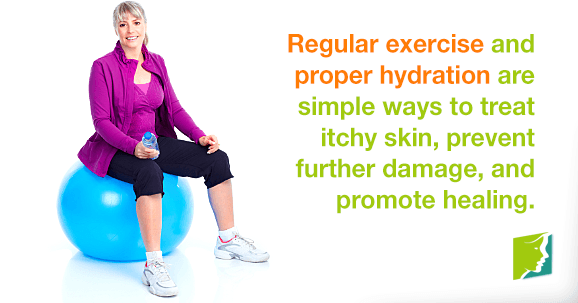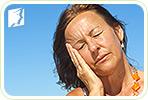There are few things quite as distracting as itchy skin. With causes ranging from dehydration to hormonal imbalance, once an itch starts, it can be hard to focus on anything but scratching. Fortunately, there are simple ways to alleviate itchy skin without even having to hit the pharmacy. Read on for tips and tricks to saving your skin from damage and getting on the road to recovery.
Stay Hydrated
The easiest way to improve the quality of your skin is to moisturize from the inside out by drinking plenty of water throughout the day. Experts recommend four 16-ounce glasses a day to stay properly hydrated. Regular water intake not only reduces skin irritation but also improves overall health and encourages your body to function at its best.
Watch Your Diet
Unexpected causes of itchy skin, such as vitamin deficiency, can be easily remedied by small dietary changes. Dark leafy greens like spinach contain vitamins B2 and B6 and protect against dermatitis, while foods rich in soy and vitamin C promote collagen production. It's also helpful to load up on omega-3 fatty acids, which help maintain the skin's oil barrier, preventing dryness. Excellent sources include salmon, walnuts, fortified eggs, sardines, and flaxseed, among others.
Know Your Allergies
Allergies may seem like an obvious source of itchy skin, but it's important to get tested - new allergies can develop or disappear throughout a person's life. Certain types of clothing and metal jewelry are common irritants that can go overlooked when searching for the source of irritation. Check labels on body soap and laundry detergent to ensure that fragrance compounds are not the culprits.
Avoid Stress
Psychological distress can sometimes come with physical side effects, and itchy skin may be one of them. Carve time out of your day for exercise to combat stress, whether you prefer high-intensity aerobics or soothing yoga. Avoid situations that cause anxiety as much as possible in order to ease your mind and reduce itchy breakouts.
Get a Dehumidifier
Environmental conditions also play a role in the condition of your skin. Hot, humid air can induce excessive sweating and result in a generally prickly, itchy feeling that may form a raised rash when scratched. As temperatures soar in summer months, it's as important to protect yourself indoors as it is outside. Your skin will thank you for investing in a dehumidifier to keep both of you breathing easy.
The common thread through all of these methods is, of course, a healthy lifestyle based on a balanced diet and regular exercise routine. If itchy skin persists, however, it may be time to seek more information or medical help. Stay informed and try these methods to take steps toward calmer, happier skin every day. Click on the following link for further information about treatments for itchy skin.
Sources
- National Health Service UK. (2014). Prickly Heat. Retrieved January 7, 2016, from http://www.nhs.uk/conditions/Prickly-heat/Pages/Introduction.aspx
- National Institutes of Health. (2014). Itching. Retrieved January 7, 2016, from https://www.nlm.nih.gov/medlineplus/ency/article/003217.htm



